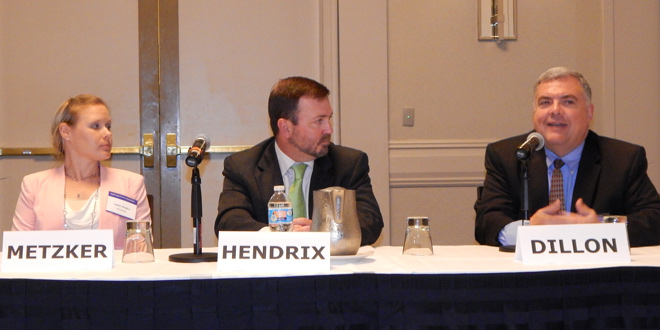By Rich Heidorn Jr.
LITTLE ROCK, Ark. — The Federal Energy Regulatory Commission’s April 16 decision not to change the start of the gas day is forcing SPP to make an uncomfortable choice between risks, stakeholders said last week.
FERC moved the timely nomination cycle deadline for scheduling gas transportation from 11:30 a.m. to 1 p.m. CT and added a third intraday nomination cycle. But, in the face of gas industry opposition, it declined to move the start of the gas day to 4 a.m. CT from 9 a.m. CT (RM14-2). (See FERC Approves Final Rule on Gas-Electric Coordination.)
“The electric industry wanted the gas industry to move their timelines and the gas industry said, ‘We were first; we don’t want to move, you move,’” summed up Tony Delacluyse, director of Power Costs Inc., during a discussion at the Gulf Coast Power Association’s SPP briefing. “And FERC did something they always do, they kind of picked something in the middle.”
FERC required each ISO and RTO to revise its day-ahead market timeline to coordinate with the pipeline scheduling changes or show why changes shouldn’t be implemented.
Richard Dillon, SPP director of market design, said SPP and other RTOs are considering moving the close of their electric markets to 8 a.m. CT — but with misgivings.
The current schedules make it impossible to clear the electric market in the time between when next-day gas prices are posted at about 9 a.m. CT and the current 11:30 a.m. timely nomination cycle deadline, Dillon said. The additional 90 minutes to the later nomination deadline makes it “a little more feasible,” Dillon said.
“We’re trying to figure out how to balance the risk. If I close the nominations for the electric market at 8 a.m. then I do not know tomorrow’s gas price,” Dillon explained. “But I have to close it at 8 a.m. to make the 1 p.m. nomination for the gas market. So there’s a lot of debate going on not just here but at the other RTOs about what’s the right balance of risk.”
“It’s definitely something that the membership is split on,” agreed Amber Metzker, manager of market operations for Xcel Energy.
Moving the close of the electric market to 8 a.m. would mean losing “certainty on price, certainty on transmission outages and all those things that go into the market clearing engine,” she said.
The benefit of such a change? Knowing how much gas you need to buy, Metzker said. “Right now the quantity of gas you’re buying is unknown because of the fact that the market is clearing after the fact of you submitting your offers in the day-ahead [market].”
Dillon said there was likely to be only limited coordination among RTOs regarding energy market schedules. (See PJM Considering Change to Day-Ahead Deadlines in Response to FERC Gas Schedule Order.)
“Right now New York’s not coordinating with anyone else’s timeline. New England is different than New York and PJM. I do not believe ERCOT is going to change, which means there wouldn’t be coordination there,” he said. “Some parties would say ‘Oh, that doesn’t matter.’ Well we have entities that actually have switchable generation. So they make a decision as to, ‘Am I going to be in ERCOT or SPP?’”
Dillon said SPP’s Gas-Electric Coordination Task Force and its Market Working Group will discuss the options and make recommendations.




